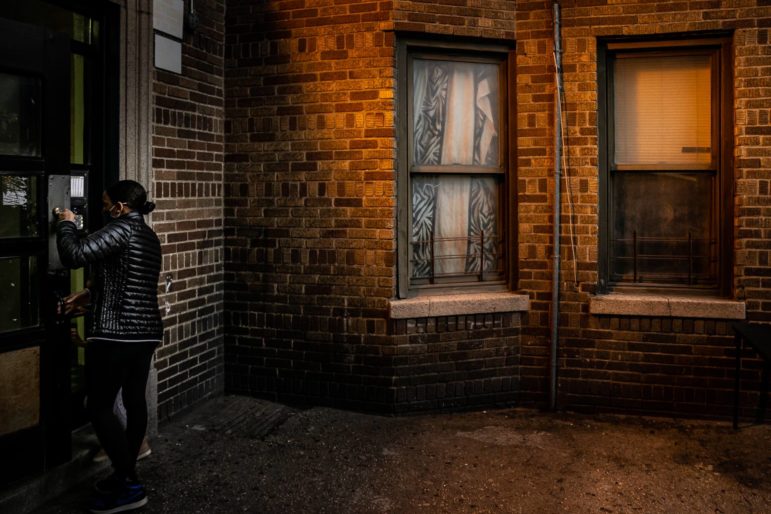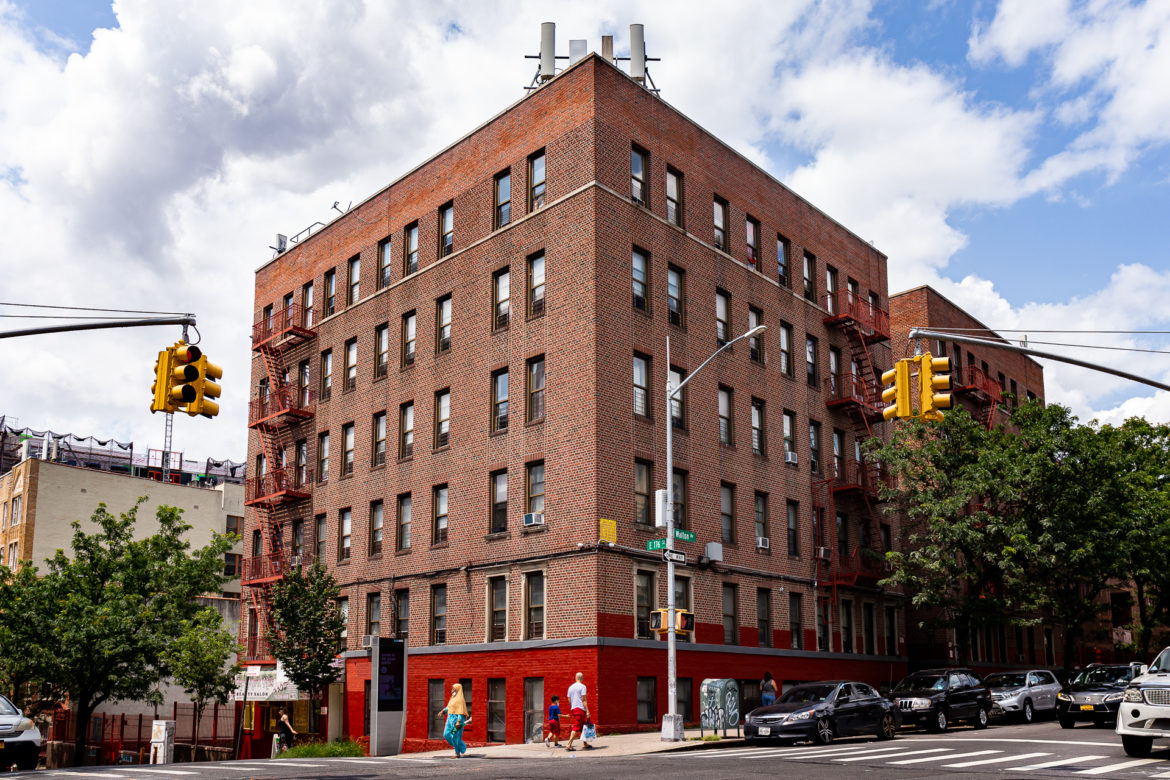The audit, by State Comptroller Thomas DiNapoli, cited “inefficiencies and irregularities” in the city’s administration of the CityFHEPS voucher program, causing “significant delays in families and individuals being able to obtain permanent housing.”

Adi Talwar
A tenant entering their building in the Bronx.An audit released Thursday by State Comptroller Thomas DiNapoli cited “inefficiencies and irregularities” in the city’s administration of its main rental voucher program—making it harder for participants to find housing as New York City experiences historically high rates of homelessness.
The audit, which was based on a sample of 52 households participating in the City Family Homelessness and Eviction Prevention Supplement program, known as CityFHEPS, echoes issues highlighted by City Limits’ previous reporting, in which voucher holders describe administrative delays and bureaucratic hurdles that make it harder for them to use the subsidies to move out of shelter.
“The New York City Department of Social Services should improve its management of the CityFHEPS program to ensure every dollar goes towards helping people experiencing homelessness,” DiNapoli said in a statement. “The housing affordability crisis in New York City underscores the importance of an effective and efficient rental assistance program.”
DSS, which administers CityFHEPS, disputed the audit’s findings, saying it “contains multiple inaccuracies and misstatements,” and pointed to other, external factors that can make rental vouchers—in which participants typically pay no more than 30 percent of their income on rent, with the voucher covering the rest—can be difficult to use.
Affordable housing on the city’s rental market is the scarcest it has been in decades, with a particular shortage of lower-rent options: just 0.39 percent of units renting for under $1,100 were available last year, according to the most recent data. Voucher holders also face frequent source of income discrimination from building owners who won’t rent to them, despite the practice being illegal.
“While this vacancy rate creates a real hardship in finding affordable housing, DSS still continues to move out record numbers of clients,” said Christine Maloney, deputy commissioner for DSS’ Office of Audit & Quality Assurance Services, pointing to a 20 percent increase in households placed in permanent homes after leaving shelter this year compared to last.
“DSS remains committed to its mission of serving New York City’s most vulnerable population in the most efficient and effective manner, while adhering to all applicable rules, regulations, and laws by which we are bound,” Maloney said in a response to the findings.
Still, the audit details a number of issues. It pointed to “significant delays” in the process of leaving shelter and moving into a home with a voucher. For the 52 cases reviewed by the comptroller, it took households an average of nearly 10 months to land an apartment after they were issued their first “shopping letter,” from the city, which enables them to start their search and is only good for 120 days before it must be reissued.
The audit says DSS takes a “hands-off approach” in that housing search, with voucher households “left on their own to seek out prospective landlords who would accept CityFHEPS.” (DSS disputed this, with Maloney saying the agency “assists clients in their search to find permanent housing from day one,” through case management, employment assistance and meetings with shelter housing specialists.)
Auditors noted delays with the issuance of shopping letters themselves, which took anywhere from 10 days to 133 days for the households it reviewed to receive them. The report also identified late subsidy payments to landlords accepting the vouchers, saying DSS “did not make timely rental assistance payments in seven instances,” of the cases it was able to review records for (12 of the 52 participants.) In one example, a December rent payment wasn’t issued until April; in another, DSS continued to pay a landlord for two months after the voucher holder had already moved out.
The Comptroller’s Office also took issue with how DSS monitors people once they leave the shelter system, saying it found “inaccuracies” in the agency’s shelter exit data, which is input into a database called DHS CARES.
“The CARES data plays an important role in identifying households who are potentially eligible for CityFHEPS and therefore its reliability is critical to CityFHEPS’s mission,” the audit reads, noting about a dozen instances where households were coded incorrectly as having left shelter when they had not.
RELATED READING: Exit Unknown—Where Do People Go After Leaving NYC Homeless Shelters?
Beyond the operations of the program itself, the auditors highlighted issues in DSS’ oversight of nonprofits contracted to manage apartments purchased by the city to house homeless New Yorkers using CityFHEPS vouchers.
The report examined conditions in 14 buildings in the Bronx—which had previously been used as cluster shelter sites—which the city purchased for $122 million in 2021 to convert into permanent homes, as City Limits was first to report at the time; the sites were in desperate need of repairs.
Two years later, roughly 20 percent of the units in those buildings that were set aside for voucher tenants (116 of the 567 apartments) were still empty and deemed “uninhabitable,” as of December 2023, according to the audit. The properties had 5,374 open violations between them as of March, the report found.

Adi Talwar
1857 Walton Ave. in the Bronx, one of more than a dozen buildings the city purchased in 2021 to convert from “cluster site” shelters to permanent housing for families experiencing homelessness.
In its audit response, DSS’ said it is working the city’s Department of Housing, Preservation and Development and the nonprofit developers contracted to run the buildings to make ongoing repairs, saying the original intent of purchasing the properties was to “ensure dilapidated apartments are renovated and we can move more clients from shelter to permanent housing.”
The buildings were “not suitable for long-term affordable housing” without “substantial rehabilitation,” Maloney wrote. “There are tenants linked to a vast majority of the units, but some tenants have been temporarily relocated to make the necessary rehabilitation work possible,” she said.
In the most recent fiscal year, the city’s budget included $816 million for CityFHEPS, up from $174 million five years ago. The vouchers are considered one of the most important tools available to help homeless New Yorkers secure housing in a city of ever-increasing rents.
The program has also been the source of a months-long dispute between city lawmakers and the Adams administration, which has refused to implement a series of bills passed by the City Council last year to expand CityFHEPS eligibility. The two parties are currently locked in a lawsuit over the legislation.
To reach the editor, contact Jeanmarie@citylimits.org.
Want to republish this story? Find City Limits’ reprint policy here.








